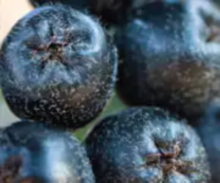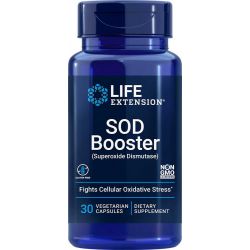Superoxide Dismutase Boosting
Antioxidants protect your cells from cellular stress. You’ve heard of dietary antioxidants like vitamin E, vitamin C and CoQ10. But the body doesn’t rely entirely on you for antioxidant protection: it can make several of its own antioxidants, with one of the most important of this group being superoxide dismutase—or simply SOD.
Superoxide dismutase is among the body’s most powerful antioxidants, protecting your cells against cellular stress.
Superoxide Dismutase Boosting
 For years, scientists have sought a way to boost one of the body’s most powerful natural antioxidant enzymes: superoxide dismutase (SOD). Present both inside and outside cell membranes, SOD is one of the body’s primary internal antioxidant defenses, and plays a critical role in reducing the oxidative stress implicated in atherosclerosis and other life-threatening diseases. Studies have shown that SOD can play a critical role in reducing internal inflammation and lessening pain associated with conditions such as arthritis.
For years, scientists have sought a way to boost one of the body’s most powerful natural antioxidant enzymes: superoxide dismutase (SOD). Present both inside and outside cell membranes, SOD is one of the body’s primary internal antioxidant defenses, and plays a critical role in reducing the oxidative stress implicated in atherosclerosis and other life-threatening diseases. Studies have shown that SOD can play a critical role in reducing internal inflammation and lessening pain associated with conditions such as arthritis.
Until recently, attempts to supplement with oral preparations of pure SOD enzyme proved disappointing, since the SOD protein molecule is easily deactivated by harsh acids and enzymes contained in the digestive tract. Scientists have conquered these challenges by creating bioavailable forms of SOD using natural plant extracts.
 By strengthening the body’s primary antioxidant systems, novel SOD-boosting supplements may offer the most powerful free radical protection available today.
By strengthening the body’s primary antioxidant systems, novel SOD-boosting supplements may offer the most powerful free radical protection available today.
The antioxidant enzymes produced within our bodies are complex proteins that often incorporate minerals such as selenium or zinc in their intricate structures. These antioxidant enzymes serve as the body’s most potent defense against free radicals and ensuing inflam-matory reactions. They include glutathione peroxidase, catalase, and perhaps the most important internally generated antioxidant of all: superoxide dismutase (SOD).
In the liver, enzymes such as glutathione peroxidase act as catalysts, facilitating reactions that render toxins less harmful.
Some of the most potentially harmful substances in the body are not toxins that enter from the external environment, but rather internally generated pro-oxidants. While oxygen is essential for life, its use comes at a cost, as it poses a potential threat to biological systems. Accordingly, living systems require an entire system of compounds dedicated to neutralizing oxygen’s harmful effects.
The enzyme superoxide dismutase (SOD) is one of the body’s foremost antioxidant defenses, reducing free radical damage associated with atherosclerosis, stroke, and arthritis. New bioavailable forms of SOD offer superior protection against oxygen free radicals.
Disarming Superoxide Radicals
Superoxide dismutase is arguably the body’s most crucial antioxidant, as it is responsible for disarming the most dangerous free radicals of all: the highly reactive superoxide radicals. Superoxide radicals, or anions (negatively charged atoms), are produced when oxygen gains an excess electron. This occurs through normal metabolic processes, such as the catalytic transformation of various molecules by enzymes.
SOD is responsible for catalyzing the conversion of superoxide to elemental oxygen and hydrogen peroxide. This transformation is called dismutation, hence the enzyme’s name. Although hydrogen peroxide is also a pro-oxidant compound, it is subsequently converted by the enzymes catalase and glutathione peroxidase to simple water and oxygen.
Formulating Bioavailable SOD
 The French team examined the antioxidant and anti-inflammatory properties of SOD extracted from melon, in both laboratory cell studies and live animals. Their studies showed that the antioxidant properties attributed to the melon extract were indeed due to active SOD. The SOD prompted immune cells (macrophages) to release the anti-inflammatory cytokine interleukin-10 rather than inflammatory tumor necrosis factor, which the cells may release under conditions of oxidative stress. Subsequent studies of live animals showed that SOD levels increased when SOD/gliadin was administered orally. This led the scientists to conclude that it is possible to elicit the pharmacological effects of this antioxidant enzyme in animal subjects.
The French team examined the antioxidant and anti-inflammatory properties of SOD extracted from melon, in both laboratory cell studies and live animals. Their studies showed that the antioxidant properties attributed to the melon extract were indeed due to active SOD. The SOD prompted immune cells (macrophages) to release the anti-inflammatory cytokine interleukin-10 rather than inflammatory tumor necrosis factor, which the cells may release under conditions of oxidative stress. Subsequent studies of live animals showed that SOD levels increased when SOD/gliadin was administered orally. This led the scientists to conclude that it is possible to elicit the pharmacological effects of this antioxidant enzyme in animal subjects.
Melon Extract Formulation Delivers Intact SOD Enzymes
 Delivering whole enzymes via the oral route is difficult because they are large protein molecules readily degraded in the stomach. The SOD enzyme in the melon extract is just such a large protein, so the developers had to find a way to prevent that degradation.
Delivering whole enzymes via the oral route is difficult because they are large protein molecules readily degraded in the stomach. The SOD enzyme in the melon extract is just such a large protein, so the developers had to find a way to prevent that degradation.
Their solution was to encapsulate the SOD enzymes in a protective sheath of organic material that allows the enzyme to pass unscathed through the stomach into the intestine, where it can be maximally absorbed. Studies show that this melon concentrate, given orally, results in significant increases in plasma SOD levels after just 12 days.
Chokeberry (Aronia melanocarpa) promotes SOD production
 Chokeberry (Aronia melanocarpa) fruit, is a condensed source of polyphenols (714 mg/g), especially anthocyanin glycosides (56.6%).
Chokeberry (Aronia melanocarpa) fruit, is a condensed source of polyphenols (714 mg/g), especially anthocyanin glycosides (56.6%).
Chokeberry anthocyanins promote SOD production
Aronia has been also shown to decrease lipid peroxidation, as well as oxidative stress. In vitro research found an anti-clotting effect. Drinking aronia berry juice reduced exercise-induced oxidative damage to red blood cells.
Chokeberry (Aronia melanocarpa) also showed improvements in lipid profiles, glucose metabolism, and reduced LDL oxidation.
In a host of studies, aronia compounds inhibited proliferation of human cervical tumor cells, killed malignant brain tumor cells, reduced biological markers of colon cancer, and helped prevent gastric ulcers.
How Do Antioxidants Like SOD Work?
Antioxidants “quench” free radicals—compounds that cause unwanted cellular reactions. But how do they do it? Certain processes in your body naturally produce free radicals: the compound called “superoxide,” for instance. SOD (superoxide dismutase) breaks down superoxide before it can cause cellular stress.
Summary
 The enzyme superoxide dismutase (SOD) is one of the body’s foremost antioxidant defenses, reducing free radical damage associated with atherosclerosis, stroke, and arthritis. New bioavailable forms of SOD offer superior protection against oxygen free radicals.
The enzyme superoxide dismutase (SOD) is one of the body’s foremost antioxidant defenses, reducing free radical damage associated with atherosclerosis, stroke, and arthritis. New bioavailable forms of SOD offer superior protection against oxygen free radicals.
Both, Aronia melanocarpa (chokeberry) extract and melon pulp concentrate (Extramel®) promotes superoxide dismutase production.
Aronia melanocarpa is packed with naturally occurring polyphenols called anthocyanins, which promote the body’s natural SOD production. A two-month study showed that participants who took 300 mg daily of chokeberry extract had a 29% increase in superoxide dismutase.
Concentrate of a special variety of French melon (Extramel®) is specifically formulated to withstand the body’s digestive juices, which gives its compounds more time to promote superoxide dismutase production. Pre-clinical models demonstrated that consuming Extramel® melon concentrate increased SOD levels.
Material used with permission of Life Extension. All rights reserved.


